It looks like you're using an Ad Blocker.
Please white-list or disable AboveTopSecret.com in your ad-blocking tool.
Thank you.
Some features of ATS will be disabled while you continue to use an ad-blocker.
share:
Good evening everyone. This is my second of two papers I wrote this term which I've adapted over for this setting to share with ATS. My first one on
Napoleon was written as a side thing, more than anything else. It turned into a serious effort only after I was gripped by the story itself. It was
worth every moment put into it, in the end.
This is different, and this one was a serious and hard research effort from the start. Napoleon also hadn't required Academic journal sourcing. This one did. So, the breadth and depth of information is different. Not better, perhaps, but different. I've tried to adapt both in a way to be very informative and entertaining at once. I hope I've succeeded. Anyway, enough preamble. Onto the main event.

Anarchism is among the most commonly misunderstood world views which we see carried by people today. Anarchy is often thought of as a condition without order or the state which follows a complete collapse of civil order. That is accurate as a definition of the word, if taken alone. When Anarchy is used to describe the political and economic ideology of the same name, it carries the opposite meaning. Anarchy as a philosophy carries a very clear order and structure in each of its forms.
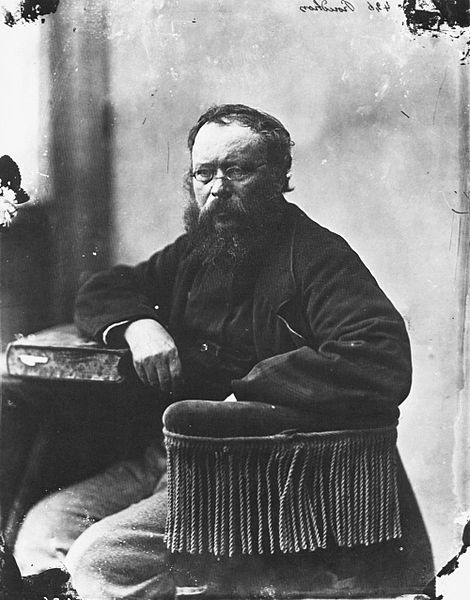
Anarchism is first seen in use as a term in 1793 within the book “Inquiry Concerning Modern Justice” by William Godwin. Following this first mention, the man considered to be the founder of modern Anarchism is Pierre Joseph Proudhon. Proudhon describes his philosophy in his 1840 treatise entitled “What is Property”. This early form of Anarchy is described in simple terms that fit the times it was considered in. Proudhon envisioned a society where bartering items of equal value would replace currency for trade, concentration of wealth by inheritance became a thing of the past, and people organized freely into associations of mutual benefit without a sovereign.
One aspect that is seen early within the origins of Anarchism is a deep dislike and distrust for the communist system. A form later termed Communist Anarchism would follow the teachings of Karl Marx and become widely known in later years. Proudhon was the first to describe Individual Anarchism as a bottom up approach to organizing society in a local fashion. Communism, he says in his book, works from a top down approach that requires the State remain as sovereign over the people.
Proudhon’s pivotal work and texts contributed the structure of ideas for what would become an influential movement. He was not the only one of his time to work toward seeing this system take hold. The late 19th century saw more than one man take up the cause of Anarchy and help further define it as they saw fit.
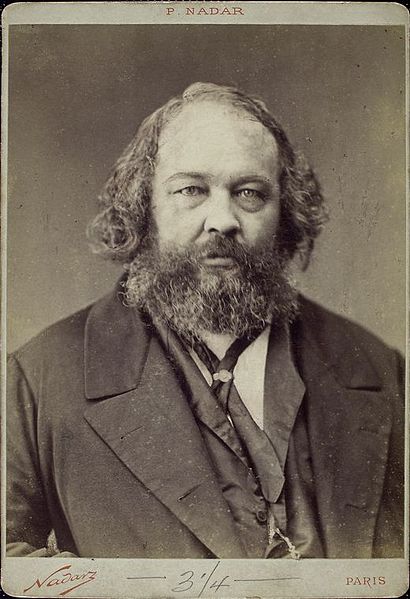
Michael Bakunin follows Pierre Proudhon as being among the most historically significant leaders in the early Anarchist movement. Bakunin brought several new ways of thinking to the table. Among those was a desire to see the total destruction of the State, an identification with atheism, and the rejection of political change in favor of revolutionary action. Bakunin’s approval of violence against agents of oppression led to nihilism in Russia and individual acts of terrorism. The result was Anarchy becoming synonymous with assassination and chaos within the minds of the public.
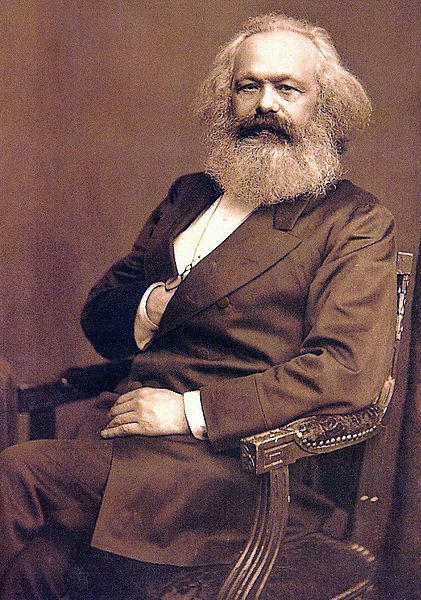
There is another important area where Michael Bakunin comes into the history of Anarchy and that is with the International Working Men’s Association, or IWMA. Karl Marx and Proudhon were among the members of the IWMA at this time and there wasn’t consensus for the future direction to follow. Marx favored political action, while Bakunin sought direct action and revolt to overthrow the sovereign. This rivalry came to a head in 1872 when Bakunin was expelled from the IWMA, leaving Marx to pursue his own political approach.
Proudhon, Bakunin, and Marx were major names for this time in the European Anarchist movement. The United States was also experiencing its first views of an emerging philosophy around this time with very mixed reactions.
. . .onto America
This is different, and this one was a serious and hard research effort from the start. Napoleon also hadn't required Academic journal sourcing. This one did. So, the breadth and depth of information is different. Not better, perhaps, but different. I've tried to adapt both in a way to be very informative and entertaining at once. I hope I've succeeded. Anyway, enough preamble. Onto the main event.
Anarchism: A History, Origins and Context

Anarchism is among the most commonly misunderstood world views which we see carried by people today. Anarchy is often thought of as a condition without order or the state which follows a complete collapse of civil order. That is accurate as a definition of the word, if taken alone. When Anarchy is used to describe the political and economic ideology of the same name, it carries the opposite meaning. Anarchy as a philosophy carries a very clear order and structure in each of its forms.
Pierre Joseph Proudhon

Anarchism is first seen in use as a term in 1793 within the book “Inquiry Concerning Modern Justice” by William Godwin. Following this first mention, the man considered to be the founder of modern Anarchism is Pierre Joseph Proudhon. Proudhon describes his philosophy in his 1840 treatise entitled “What is Property”. This early form of Anarchy is described in simple terms that fit the times it was considered in. Proudhon envisioned a society where bartering items of equal value would replace currency for trade, concentration of wealth by inheritance became a thing of the past, and people organized freely into associations of mutual benefit without a sovereign.
One aspect that is seen early within the origins of Anarchism is a deep dislike and distrust for the communist system. A form later termed Communist Anarchism would follow the teachings of Karl Marx and become widely known in later years. Proudhon was the first to describe Individual Anarchism as a bottom up approach to organizing society in a local fashion. Communism, he says in his book, works from a top down approach that requires the State remain as sovereign over the people.
Proudhon’s pivotal work and texts contributed the structure of ideas for what would become an influential movement. He was not the only one of his time to work toward seeing this system take hold. The late 19th century saw more than one man take up the cause of Anarchy and help further define it as they saw fit.
Michael Bakunin

Michael Bakunin follows Pierre Proudhon as being among the most historically significant leaders in the early Anarchist movement. Bakunin brought several new ways of thinking to the table. Among those was a desire to see the total destruction of the State, an identification with atheism, and the rejection of political change in favor of revolutionary action. Bakunin’s approval of violence against agents of oppression led to nihilism in Russia and individual acts of terrorism. The result was Anarchy becoming synonymous with assassination and chaos within the minds of the public.
Karl Marx

There is another important area where Michael Bakunin comes into the history of Anarchy and that is with the International Working Men’s Association, or IWMA. Karl Marx and Proudhon were among the members of the IWMA at this time and there wasn’t consensus for the future direction to follow. Marx favored political action, while Bakunin sought direct action and revolt to overthrow the sovereign. This rivalry came to a head in 1872 when Bakunin was expelled from the IWMA, leaving Marx to pursue his own political approach.
Proudhon, Bakunin, and Marx were major names for this time in the European Anarchist movement. The United States was also experiencing its first views of an emerging philosophy around this time with very mixed reactions.
. . .onto America
Anarchism in America - Mixed Results
Josiah Warren
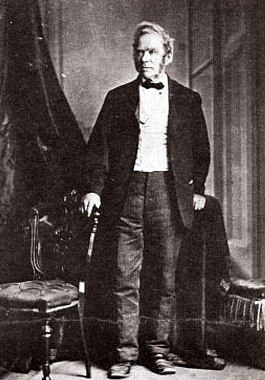
The Anarchist movement in the United States can technically be traced back to the attitudes and approaches voiced by Thomas Jefferson and others around our nation’s founding. However, in the strict sense of using the title Anarchist, the origins in America start with Josiah Warren.
Anarchism is a new philosophy in terms of world political views, and individuals form the history in a way which is not true in other world views. Mr. Warren and his inspiration of others would prove pivotal in this way. He is likely best known for the commune he founded on Long Island carrying the name “Modern Times” in 1850.
The Modern Times commune was inspired by an earlier attempt at utopian communism built by Robert Owen and named New Harmony. The New Harmony colony did not last long and the problems Warren saw in it are what he sought to prove could be correct at Modern Times.
All the members of Modern Times voluntarily performed the tasks necessary for the community as a whole. Leadership was handled in a communal way and without rigid structure. The result proved that the concept could work while spawning other “Utopian Colonies”. Warren’s experiment stood for 12 years and led others to the movement by its example of success.
Josiah Warren inspired another American by the name of Benjamin R. Tucker. Tucker is referred to in some places as the most widely known Anarchist in American history. He went on to become a force that shaped the movement in early 20th century America.
Benjamin R. Tucker
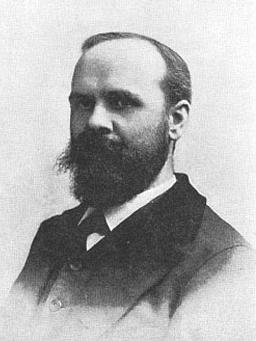
Tucker advocated his concept of individual liberty in a newspaper he published between 1881 and 1908, simply titled “Liberty”. It helped define Individual Anarchism as “The belief in the greatest amount of liberty compatible with equality of liberty.” Equality is a theme which runs deep in the Anarchy movement and comes to define it in core ways.
The ideas were revolutionary for the time, but Tucker is among the line of Anarchists who came to strongly oppose any force or direct action in bringing about change. Liberty carried the message of education which should lead to passive resistance, and eventually, the collapse of the sovereign through a population demanding better conditions.
Benjamin Tucker came as a contradiction to the Communist Anarchists who were also active in America at this time. In contrast to the Communists, Tucker supported a position of complete non-interference in all spheres of economic activity. He believed that wealth would distribute itself in a free market in line with natural principles of economics. He also championed such radical views as a complete objection to majority rule, organized religion and marriage. In Tucker’s view, these things encroached directly on the principle of individual liberty to an unacceptable degree
Labor, Chicago and the Haymarket Square Riots
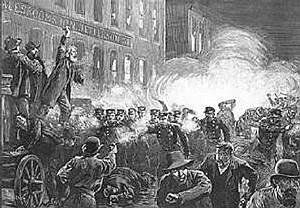
Up to this point in the Anarchist movement, no actions had not resulted in any major public attention. This was especially true in the United States, where local action was gaining notice but nothing was registering nationally. That would all change in 1886.
May 1st or May Day as it’s been named as a day of observance, is often thought of as a communist or socialist event. Many may not have taken time to learn just why we remember that day or what events led to it gaining importance. The story behind May Day is a defining moment in the course of Anarchism.
The whole event started over an issue of hours worked in a day. The American Federation of Labor passed a resolution declaring that “eight hours shall constitute a legal day’s work from and after May 1, 1886, and that we recommend to labour organizations throughout this district that they so direct their laws as to conform to this resolution.”
In Chicago during the spring of 1886, the Anarchists were the main force in organized labor. Largely as a result of this, the Unions called for a general strike in solidarity and followed thorough when the day came. In Chicago alone, 400,000 workers went out and 45,000 more were granted a short day without striking to achieve it.
The strike carried on and led to violence on May 3rd. Pickets at the McCormick Harvester Machine Company were fired upon by police with five or six serious casualties and unknown numbers of injured. Anarchists called for a meeting the following day.
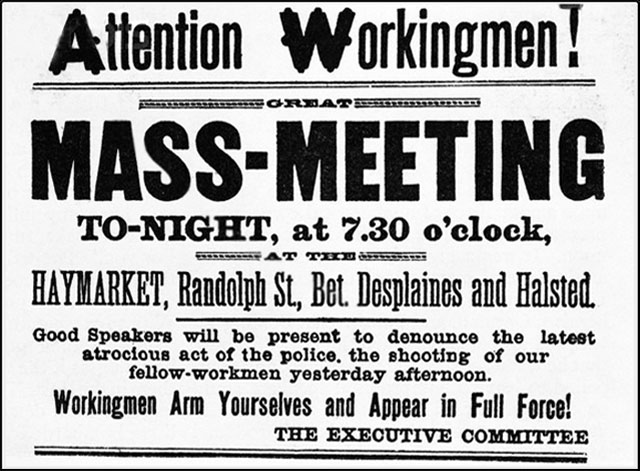
May 4th saw Anarchists and labor meet at Haymarket Square to discuss and protest the brutality of the events of the previous day. What happened next was never firmly established in fact but what is known is that 180 police arrived as the meeting was breaking up. At the moment of confrontation between police and protesters, a bomb was thrown among the police ranks. A large explosion followed and the police immediately opened fire into the crowd of protesters.
No solid figures are available for the numbers of civilians hurt or killed on that day. We do know that seven policemen were killed in the fight. In a bit of irony within the historic record, only one was the victim of the bomb. The other six police officers fell as a result of bullets fired by other police on the scene.
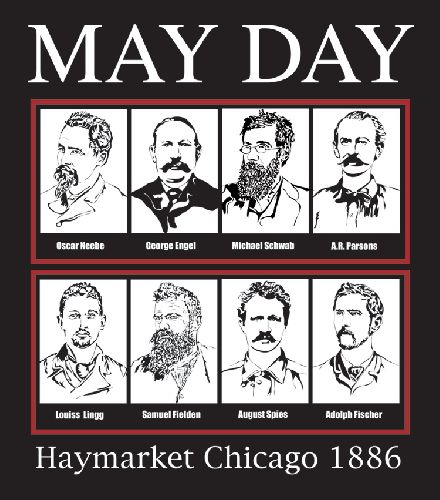
The events of Haymarket Square led to the arrest, charging and trial for eight of the best known Anarchist among the movement in Chicago. The precise logic for choosing those eight individuals is not clear, but we know by reports only a few of them were even at the scene of the bombing when it happened.
The jury selected by a special bailiff comprised businessmen and a relative of one of the slain officers. The verdict was death for seven of the eight with the last receiving a 15 year sentence. International pressure saw two of the sentences commuted to life in prison while four were executed and the remaining man committed suicide on the eve of his execution.
The survivors were vindicated in 1893 when the Governor of Illinois granted unconditional pardons while adding in an unusual public statement “the trial was not fair”.
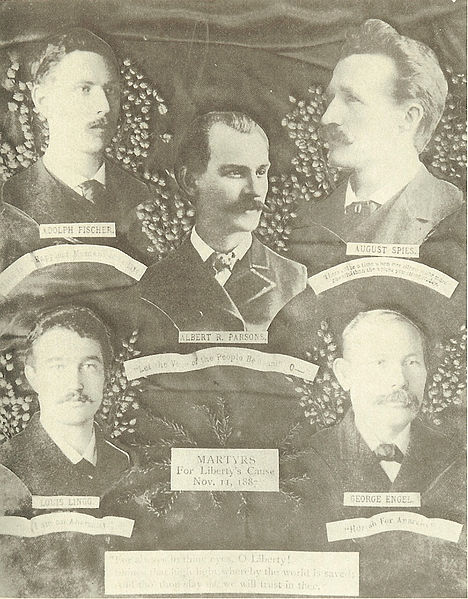
(The Martyrs of Haymarket Square)
Anarchism After Haymarket

The Anarchists stay true to the origins of May Day and it is celebrated with the special meaning carried forward from that terrible day in Chicago and the miscarriage of justice which followed. May Day is established to remember those of the Anarchist movement that gave their lives for an idea and a sense of justice for working people.
The years which followed the events in Chicago saw the rise of Anarchists in both America and Europe. In Europe, Anarchists would play a pivotal role in both the 1905 and 1917 Russian Revolutions. They would soon find themselves at odds with Lenin and later, Stalin for what came to be an interesting reversal of positions. Bakunin had predicted the failure of Communism with its top down approach to empowerment of the people and was proven correct.
Anarchism changed in the 1920’s and 30’s by the success of the Communist Revolution in Russia. Anarchism became marginalized in many nations and radicals who may have joined the movement were instead taken with communism.

Anarchists remain a force in world geopolitics today and have been seen more recently within events like Occupy Wall Street and the counter-culture revolution of the 1960’s. It is true to say that Anarchists have not had the opportunity to see their world view tested in a national setting, but they are within much of what we see happen. I was personally a part of the Occupy America movement and lived in the Occupy STL camp during late 2011.
St. Louis, Missouri was representative of the majority of camps by my personal observation and position to see others around the nation and beyond. At its height, I read reports for camps in 49 states and 12 nations that comprised some 4.2 million people.
Among those I knew in St Louis were some within the Anarchist movement. A couple I met represented the extremes of it. There is little doubt in my mind after this research and my own experiences in the Occupy protests that Anarchism has been a force of history and is a strong force in politics today.
As I noted at the start, this paper was written formally and for a course term assignment. The assignment was easy enough. Pick an "Ism" and write
about it. Well, Anarchism was my thought after a couple less appropriate Isms crossed my screen for ideas and promptly crossed back off. (You'd be
surprised at the true range of "isms" in the world and across history). Since this was formed as a proper paper and simply adapted with graphics added
for ATS, I decided to include the citation page. One minor change was made in this list, and those with experience in this sort of thing will spot it
quickly enough. It's an adjustment for privacy, not accuracy.
Afaq. "What are some examples of "Anarchy in Action"?" 12 11 2008. Anarchist Writers. Web. 17 04 2014.
Anarcho-1. "A brief history of Anarchism." 01 05 2013. Anarchist Writers. Web. 17 04 2014.
Anarcho-2. "Review of Bakunin's Statism and Anarchy." 03 02 2011. Anarchist Writers. Web. 17 04 2014.
Caplan, Bryan. "Marxist Origins of Communism." 01 01 2013. Museum of Communism. Web. 17 04 2014.
Crabtree, Brian. "The History of Anarchism." 01 01 1992. Spunk Library. Web. 17 04 2014.
Madison, Charles A. "Anarchism in the United States." Journal of the History of Ideas 6.1 (1945): p.46-66. JSTOR Journal. .
Merriam, Webster. "Encyclopedia Brittanica." 01 01 2014. Dictionary. Web. 17 04 2014.
Proudhon, Pierre J. What is Property. Humboldt Publishing Company, 1890. Book.
Wrabbit2000. "Occupy America and how one camp worked well." 13 05 2012. Above Top Secret. Web. 17 04 2014.
**** Images used above come courtesy of Wiki Commons
Afaq. "What are some examples of "Anarchy in Action"?" 12 11 2008. Anarchist Writers. Web. 17 04 2014.
Anarcho-1. "A brief history of Anarchism." 01 05 2013. Anarchist Writers. Web. 17 04 2014.
Anarcho-2. "Review of Bakunin's Statism and Anarchy." 03 02 2011. Anarchist Writers. Web. 17 04 2014.
Caplan, Bryan. "Marxist Origins of Communism." 01 01 2013. Museum of Communism. Web. 17 04 2014.
Crabtree, Brian. "The History of Anarchism." 01 01 1992. Spunk Library. Web. 17 04 2014.
Madison, Charles A. "Anarchism in the United States." Journal of the History of Ideas 6.1 (1945): p.46-66. JSTOR Journal. .
Merriam, Webster. "Encyclopedia Brittanica." 01 01 2014. Dictionary. Web. 17 04 2014.
Proudhon, Pierre J. What is Property. Humboldt Publishing Company, 1890. Book.
Wrabbit2000. "Occupy America and how one camp worked well." 13 05 2012. Above Top Secret. Web. 17 04 2014.
**** Images used above come courtesy of Wiki Commons
edit on 8-5-2014 by Wrabbit2000 because: (no reason given)
S&f .. will pop back and read bit later .. busy day here and with my rusty english takes awhile to read and translate ..
edit on 8/5/14 by
Expat888 because: (no reason given)
a reply to: Wrabbit2000
Nicely written and presented Wrabbit. Many folks in this day do not realize there are alternatives to big centralized governments but truly there are. As a species we can decide to take another path. I hope your thread will enlighten some who do not understand that Anarchy is not chaos.
Nicely written and presented Wrabbit. Many folks in this day do not realize there are alternatives to big centralized governments but truly there are. As a species we can decide to take another path. I hope your thread will enlighten some who do not understand that Anarchy is not chaos.
Nice thread S&F
Although, I was disappointed to see that you left out the Anarchist movement of the Spanish Civil war.
Source
Source
Revolutionary Catalonia
Although, I was disappointed to see that you left out the Anarchist movement of the Spanish Civil war.
Source
Anarchism in Spain has historically gained more support and influence than anywhere else, especially before Francisco Franco's victory in the Spanish Civil War of 1936–39.
Source
The Spanish Civil War was also the high point of anarchist influence in the international workers’ movement. On the eve of the civil war, the anarchosyndicalist Confederación Nacional del Trabajo (CNT) claimed more than a million members and had as its stated aim the revolutionary overthrow of capitalism. Yet the Spanish anarchist movement failed the test that supposedly formed the heart of its program: the destruction of the state.
Revolutionary Catalonia
Revolutionary Catalonia (July 21, 1936 - 1939) was the part of Catalonia (a region in northeast Spain) controlled by the anarchist and socialist trade unions, parties, and militias during the Spanish Civil War. These included the Confederación Nacional del Trabajo (CNT, National Confederation of Labor) which was the dominant labor union at the time and the closely associated Federación Anarquista Ibérica (FAI, Iberian Anarchist Federation). The Unión General de Trabajadores (General Worker's Union), the POUM and the Unified Socialist Party of Catalonia (which included the Communist Party of Catalonia) were also involved. Though the Catalonian Generalitat was nominally in power, the trade unions were de facto in command of most of the economy and military forces.
a reply to: Bassago
You hit it on the head in one shot there. If someone asked why I chose this above other options, that is why. I was really surprised to find the truth of the matter myself. I'm not sure any Anarchists I was around in St Louis knew of the origins or the actual structured concepts (in a few forms) it takes. Very different forms from what we know today, no doubt. Not "anarchy" in the movie sense though.
I think many people think of "anarchy" as Mad Max or Waterworld where there is no law, no order and no society save for what is established by extreme use of force or hiding in peace. In short, what Somalia looked like at the height of it's chaos, and I'm not sure is much different from now, actually.
The more I found in preliminary looking to see if this Ism was to be my Ism for the assignment, the more I got hooked by HOW much Anarchism actually consisted of.
Oh..and who isn't interested in the real events and faces behind the origin of May Day? That is most definitely NOT how May Day was presented to me as a child of the 1970's and 80's.
I'd always known it was a labor holiday of course, but the Soviet's love of military parades on that day are what burned in for association and coverage I saw. Knowing the true version and details wouldn't have changed much for the times, I suppose. Still...It's a piece of our history (and more) and part of what made the world we see today.
You hit it on the head in one shot there. If someone asked why I chose this above other options, that is why. I was really surprised to find the truth of the matter myself. I'm not sure any Anarchists I was around in St Louis knew of the origins or the actual structured concepts (in a few forms) it takes. Very different forms from what we know today, no doubt. Not "anarchy" in the movie sense though.
I think many people think of "anarchy" as Mad Max or Waterworld where there is no law, no order and no society save for what is established by extreme use of force or hiding in peace. In short, what Somalia looked like at the height of it's chaos, and I'm not sure is much different from now, actually.
The more I found in preliminary looking to see if this Ism was to be my Ism for the assignment, the more I got hooked by HOW much Anarchism actually consisted of.
Oh..and who isn't interested in the real events and faces behind the origin of May Day? That is most definitely NOT how May Day was presented to me as a child of the 1970's and 80's.
I'd always known it was a labor holiday of course, but the Soviet's love of military parades on that day are what burned in for association and coverage I saw. Knowing the true version and details wouldn't have changed much for the times, I suppose. Still...It's a piece of our history (and more) and part of what made the world we see today.
a reply to: MagicWand67
I take full blame for any omissions, to be sure. In my defense, there was a general target for length, and that dictated the depth I could write the original.
I certainly appreciate your additional information as it adds to the thread though.
I take full blame for any omissions, to be sure. In my defense, there was a general target for length, and that dictated the depth I could write the original.
I certainly appreciate your additional information as it adds to the thread though.
Very well written and informative.A keen observation of the movement's history.If I were your professor I'd give you an A.As a lowly ATS member I can
only offer stars and flag
edit on CDTThupm41161 by TDawg61 because: (no reason given)
a reply to: Wrabbit2000
Great Paper, post and also photos, you have the great photo of Marx, with his hidden hand making many suspect he was an illuminist or Freemason, but some historians claim he was neither , but I do think he was an atheist.
I agree and also think that Communism and Anarchy are joined at the hip, I also think that you have revolutionaries and you have anarchists and they are useful to 5th columns or for furthering larger agendas.
I think that revolutionaries have a great cause, in many cases they feel duped or denied whatever rights their established constitution or charter may have afforded them and so they organize to restore that order or create something better, but for the Anarchist, at least from my viewpoint is they do not want any government.
The problem I have with that is akin, to the young son that grows and suddenly is living in his parents house and for whatever reasons cannot agree with the house rules any more, you have the classic adolescent rebellion, so what does he do, he throws tantrums, does everything he can to turn that house into a living hell for everyone there, but luckily there is a parent in the house that suddenly sees this nonsense and gladly delivers his deadline to pack his bags if he can't follow the rules.
I think anyone that wakes up one day and cannot agree with having any established government whatsoever in any country they live or were born in should find a way to relinquish their citizenship and simply move to an either more agreeable situation or start their own anarchist colony , don't bring those who do believe there should some form of government into your belief system of no government, but of course what eventually happens if they do leave and go to an Anarchist utopia, a natural order of leader vs follower will evolve and has to assemble the hive or rule making body, that anti governmental body will possibly begin to function in clan like configuration, thus, beginning to morph back into the unwanted informal government structure, so eventually the Anarchists will naturally have gained a new cause and that is to destroy their utopia, so can an anarchist truly be happy ?
I doubt it, so what is the real purpose of an Anarchist, well if you ask me, the true purpose as far as high level goals are concerned, Anarchists are somewhat of an asset to organized structures, or causes that must constantly have opposing forces , so I do believe that at a certain point, Anarchists and Revolutionaries can dovetail or have some common ground that can be utilized by either a fifth column or hidden organization, that is why you see Marx with his hand in his coat, there is a hidden 5th column behind most revolutions, and they take advantage of revolutionaries and also anarchists.
Great Paper, post and also photos, you have the great photo of Marx, with his hidden hand making many suspect he was an illuminist or Freemason, but some historians claim he was neither , but I do think he was an atheist.
I agree and also think that Communism and Anarchy are joined at the hip, I also think that you have revolutionaries and you have anarchists and they are useful to 5th columns or for furthering larger agendas.
I think that revolutionaries have a great cause, in many cases they feel duped or denied whatever rights their established constitution or charter may have afforded them and so they organize to restore that order or create something better, but for the Anarchist, at least from my viewpoint is they do not want any government.
The problem I have with that is akin, to the young son that grows and suddenly is living in his parents house and for whatever reasons cannot agree with the house rules any more, you have the classic adolescent rebellion, so what does he do, he throws tantrums, does everything he can to turn that house into a living hell for everyone there, but luckily there is a parent in the house that suddenly sees this nonsense and gladly delivers his deadline to pack his bags if he can't follow the rules.
I think anyone that wakes up one day and cannot agree with having any established government whatsoever in any country they live or were born in should find a way to relinquish their citizenship and simply move to an either more agreeable situation or start their own anarchist colony , don't bring those who do believe there should some form of government into your belief system of no government, but of course what eventually happens if they do leave and go to an Anarchist utopia, a natural order of leader vs follower will evolve and has to assemble the hive or rule making body, that anti governmental body will possibly begin to function in clan like configuration, thus, beginning to morph back into the unwanted informal government structure, so eventually the Anarchists will naturally have gained a new cause and that is to destroy their utopia, so can an anarchist truly be happy ?
I doubt it, so what is the real purpose of an Anarchist, well if you ask me, the true purpose as far as high level goals are concerned, Anarchists are somewhat of an asset to organized structures, or causes that must constantly have opposing forces , so I do believe that at a certain point, Anarchists and Revolutionaries can dovetail or have some common ground that can be utilized by either a fifth column or hidden organization, that is why you see Marx with his hand in his coat, there is a hidden 5th column behind most revolutions, and they take advantage of revolutionaries and also anarchists.
edit on 8-5-2014 by phinubian because: spelling
a reply to: Wrabbit2000
That was a very good article though, I wouldn't even worry about it Wrabbit! I enjoyed it.
That was a very good article though, I wouldn't even worry about it Wrabbit! I enjoyed it.
a reply to: Wrabbit2000
Good job on the paper!
I wish anarchy was a practical solution / this world would be ready for it...
Good job on the paper!
I wish anarchy was a practical solution / this world would be ready for it...
a reply to: Wrabbit2000
I enjoyed your assignment! I'm curious, what course is this for? No criticism, just random curiosity.
I enjoyed your assignment! I'm curious, what course is this for? No criticism, just random curiosity.
a reply to: brazenalderpadrescorpio
World History II in college. I took WH 1 because I had to. I took this one because I wanted to. I love history.
World History II in college. I took WH 1 because I had to. I took this one because I wanted to. I love history.
Good post ....I am a anarchist at heart and I think it is more of a individual then a group thing .Not that a group of like minded individuals cant
come together but to be put into a body of politics where the common societal structure is set ,there would seem no way to change it . There was a
good piece awhile back how a large company changed . They basically got rid of all the normal managers and the like and let the group work out the
details on producing .Strangely the work place changed in a very positive way .Not having a boss to suck up to caused those worker to actually produce
work and the little infighting caused by the gossip stopped .
There were some that left but the group as a whole were much better at resolving problems ...The story may have been from a TV program of a YT vid I watched ..Cant remember right now ....any how thanks for the read and the history of the subject ....peace a reply to: Wrabbit2000
There were some that left but the group as a whole were much better at resolving problems ...The story may have been from a TV program of a YT vid I watched ..Cant remember right now ....any how thanks for the read and the history of the subject ....peace a reply to: Wrabbit2000
Since "anarchist" carries connotations with most, I try to say that i am "extreme libertarian" or some other such phrasing. But anarchist is
about as close as you can get to my personal viewpoints.
i enjoyed the read.
i enjoyed the read.
new topics
-
12 jurors selected in Trump criminal trial
US Political Madness: 2 hours ago -
Iran launches Retalliation Strike 4.18.24
World War Three: 2 hours ago -
Israeli Missile Strikes in Iran, Explosions in Syria + Iraq
World War Three: 2 hours ago -
George Knapp AMA on DI
Area 51 and other Facilities: 8 hours ago -
Not Aliens but a Nazi Occult Inspired and then Science Rendered Design.
Aliens and UFOs: 8 hours ago -
Louisiana Lawmakers Seek to Limit Public Access to Government Records
Political Issues: 11 hours ago
top topics
-
BREAKING: O’Keefe Media Uncovers who is really running the White House
US Political Madness: 15 hours ago, 25 flags -
George Knapp AMA on DI
Area 51 and other Facilities: 8 hours ago, 23 flags -
Biden--My Uncle Was Eaten By Cannibals
US Political Madness: 16 hours ago, 18 flags -
Israeli Missile Strikes in Iran, Explosions in Syria + Iraq
World War Three: 2 hours ago, 12 flags -
"We're All Hamas" Heard at Columbia University Protests
Social Issues and Civil Unrest: 16 hours ago, 7 flags -
Louisiana Lawmakers Seek to Limit Public Access to Government Records
Political Issues: 11 hours ago, 7 flags -
So I saw about 30 UFOs in formation last night.
Aliens and UFOs: 14 hours ago, 5 flags -
Not Aliens but a Nazi Occult Inspired and then Science Rendered Design.
Aliens and UFOs: 8 hours ago, 4 flags -
Iran launches Retalliation Strike 4.18.24
World War Three: 2 hours ago, 4 flags -
The Tories may be wiped out after the Election - Serves them Right
Regional Politics: 12 hours ago, 3 flags
active topics
-
Iran launches Retalliation Strike 4.18.24
World War Three • 11 • : YourFaceAgain -
MULTIPLE SKYMASTER MESSAGES GOING OUT
World War Three • 45 • : Irishhaf -
George Knapp AMA on DI
Area 51 and other Facilities • 22 • : SchrodingersRat -
BREAKING: O’Keefe Media Uncovers who is really running the White House
US Political Madness • 15 • : BingoMcGoof -
Running Through Idiot Protestors Who Block The Road
Rant • 109 • : Astyanax -
12 jurors selected in Trump criminal trial
US Political Madness • 20 • : Lumenari -
Pfizer is 'deeply sorry'
Diseases and Pandemics • 23 • : VoiceofReality -
Israeli Missile Strikes in Iran, Explosions in Syria + Iraq
World War Three • 47 • : YourFaceAgain -
It has begun... Iran begins attack on Israel, launches tons of drones towards the country
World War Three • 887 • : 5thHead -
The Tories may be wiped out after the Election - Serves them Right
Regional Politics • 20 • : ScarletDarkness
